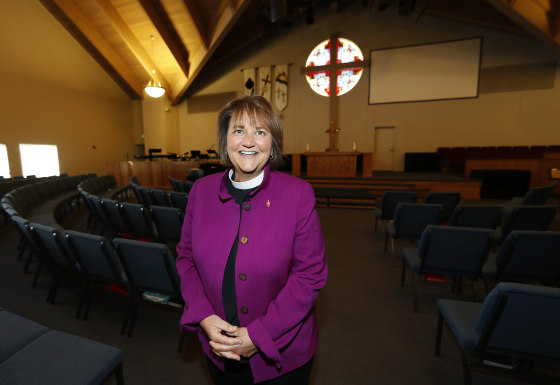United Methodists are gathered in St. Louis to try to resolve a fundamental debate that could lead to a split within the United States' second-biggest Protestant denomination: whether to accept same-sex marriage and LGBTQ clergy.
More than 850 delegates from around the world — half of them clergy and half of them laypeople — hope to decide by Tuesday whether to change the church's historical position that sexual relationships should be solely between married men and women.
Keeping that tradition is one of three plans proposed by the 12 million-member church's Commission on a Way Forward. The commission and the church's leadership broadly support a second proposal, called the One Church Plan, which would allow the ordination of LGBTQ pastors and recognition of same-sex weddings.
A complicated third plan, called the Connectional Conference, would replace the church's five regional governing conferences with three churchwide "theological conferences" — in essence, separate but partner United Methodist structures reflecting each of the key positions within the main church.
That would result in "a big church with smaller tents underneath ... connected to Christ but reaching out to many different kinds of mission," Mazvita Machinga, a commission member from Zimbabwe, said Sunday.
You can read the commission's full set of recommendations, which was presented to the delegates on Sunday, here.
"The question has been a part of our conversations for decades, really, as the church has wrestled with how to be inclusive and how to be in ministry to people in all places and all ways, while at the same time wrestling with issues of marriage and ordination," said the Rev. John McLarty, senior pastor of First United Methodist Church of Wichita Falls, Texas.
"Those are complicated issues," McLarty said in an interview with NBC affiliate KXAN of Austin, Texas.
The church's General Conference usually meets only every four years, and the next one isn't scheduled until next year. But divisions over LGBTQ issues have become so sharp that the church's Council of Bishops called the special meeting in St. Louis hoping to find a way forward now to preserve unity.
It's possible that no plan will get enough support, meaning the debate would resume at next year's full General Conference in Minneapolis.
The United Methodist Church was created in 1968 by the merger of the Methodist Church and the Evangelical United Brethren Church, and LGBTQ issues have created tensions within the church since at least 1972, when the new church's Judicial Council upheld the historical prohibition on same-sex relationships.
But the issue came to the forefront in 2016 with the election of the Rev. Karen Oliveto, who is married to a woman, as bishop of the church's Mountain Sky Conference, covering Colorado, Montana, Utah and Wyoming and part of Idaho.
The church's Western Jurisdictional Conference needed 17 ballots to agree on Oliveto's election, which was immediately followed by a statement from the president of the national Council of Bishops warning that "this election raises significant concerns and questions of church polity and unity."
Oliveto has been the subject of numerous complaints citing church law, and in 2017, the Judicial Council ruled that her election violated church policy. But she remains a bishop in good standing pending resolution of the administrative and judicial challenges.
Oliveto said in a message to her conference on Saturday that the Mountain Sky Conference was proof that it was possible for United Methodists to learn "how to live in beloved community where every child of God is beloved, wanted, celebrated, needed in order for the body of Christ to be made whole."
In 2016, T.C. Morrow of Washington, D.C., who is married to another woman, was rejected for commissioning as a deacon in the church's Baltimore-Washington Conference.
"It's frustrating to know that so many other people have left the United Methodist Church to put their good talents to use in other denominations," Morrow told NBC affiliate KSDK of St. Louis, where she is attending the special conference.
"There are faithful gay and lesbian people all across the United States and the world that are Methodists who want to serve their church," she said.
Morrow hopes the progressive One Church Plan endorsed by church leaders is approved, but she said that if it isn't, she would remain in the church to advocate for LGBTQ members.
"I hope that regardless of what happens that harm to gay and lesbian people is reduced as much as possible."



